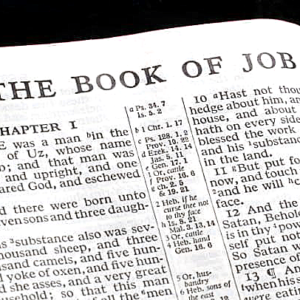
Any time you start proclaiming to Christ-followers of certain doctrinal persuasions that God is not a cosmic child abuser inflicting disaster, death, and destruction upon His children to “teach them something,” almost always the first objection you will encounter is this challenge: “Well, what about Job?”
This challenge is waved about as if some kind of a magic wand to dispel all arguments challenging these folks’ deep-seated religious traditions and doctrinal prejudices without them realizing how Christ-followers belong to an entirely different spiritual demographic than Job and his contemporaries.
Most people think Job was some sort of prophet and casually cite a few verses taken out of context from the book written about him without really knowing a thing about the man and his story. Their shallow, sometimes even complete, lack of understanding about his book is what causes so many problems. But here is, as Paul Harvey used to say, “the rest of the story!”
A Brief Biography of Job
According to Bible scholars, Job lived during what we theologians call the “patriarchal period” between The Rebellion (when Adam and Eve sinned and were expelled from Eden) and the appearance of Abraham. This timing issue is significant.
Why?
Because it predates the existence of any covenant relationship between the One True God and His creation, man (for a discussion of the significance of blood covenants, see my article on that topic here at Miscellaneous Ramblings).
On top of that, Job had no Scriptures. The first written books of the Bible were penned by Moses during the wilderness phase of the Exodus several centuries later. In Job’s day, all that existed were oral traditions.
These two facts are crucial because they demonstrate how according to the biblical record:
- Job had little revelation of the One True God beyond His general existence and His displeasure with sinful behavior.
- God had not promised Job anything he could stand in faith upon.
- Job knew nothing about the existence of a spirit realm (the alternate dimension where God and His angels as well as Satan and demons exist).
- Job was completely ignorant of the existence of Satan.
Also, because he lived millennia prior to the life, death, and resurrection of Jesus, he was unregenerate. In other words, he had not experienced the New Birth and therefore did not have the Holy Spirit dwelling inside his physical body as all Christ-followers do. As a result, he had no spiritual authority against the devil to prevent such tragedies as the ones which befell him.
Nowhere in the Bible does it describe Job as a prophet or priest empowered by calling and equipped by revelation to speak ex officio to other humans on God’s behalf. He was simply a wealthy businessman who worshipped the One True God.
On top of that, all of Job’s so-called “friends” were in precisely in the same boat!
To summarize what we know of Job:
- He was a righteous man (God said that Himself, so that is not open to debate).
- He didn’t have a covenant with God as Abraham and his descendants did.
- He didn’t have any Scriptures wherein God had revealed or promised anything to him.
- He apparently didn’t have a clue about the existence of angels, Satan, or demons.
- He was neither called nor empowered to speak on God’s behalf.
- He had not experienced the New Birth and therefore had neither the indwelling of the Holy Spirit nor any spiritual authority on the earth.
Here is another thing about the Book of Job: there is a general impression held by many people that Job’s trials went on for years and years. Actually, it all transpired over the course of only a few days or weeks, depending upon how much Job and his clueless friends said which was not included in the book and how long the pauses were between their rants.
Another popular abuse of this book is by those who have created their own personal disasters through their own sins (selfishness, greed, hatred, lust, etc.). I’ve lost count of the jail inmates I’ve heard proclaim they were going through a trial like Job when it was nothing of the sort! They were in jail pending trial because they had committed one or more crimes (in other words, they were unrighteousness) whereas Job was attacked despite the fact that God had declared him righteous.
Truly Reported vs. Truly Spoken
As a result of all these factors, the Book of Job has to be the MOST misunderstood, MOST misinterpreted, MOST misquoted book in the entire Bible. I’ve lost count of the times I’ve heard Job 1:21 unctuously and ignorantly quoted after some disaster like someone’s kid dying or other loss of a loved one saying, “the Lord giveth, and the Lord taketh away; blessed be the Name of the Lord”. There is even a popular contemporary worship tune where it says, “He gives and takes away” during its bridge.
There’s one major problem with all this. You see, Job was dead wrong!
“But wait!” you may exclaim, “It says those words right there in the Bible!”
Absolutely true! Job indeed said that. But the foundational doctrine of the verbal inspiration of the Scriptures in the original languages and their total infallibility does not extend to every word some unregenerate human said in it. In other words, the Bible truly and factually reports what was said by everyone quoted therein, but not every word spoken by some of those folks was true and factual.
For example, there are instances where the Bible quotes someone who was lying, such as Annanias and Sapphira in the Book of Acts. Elsewhere in that same book, Simon the Magician asked to buy the ability to perform miracles by the Holy Spirit. It would be ludicrous for us to assert that Annanias and Sapphira’s lies were in and of themselves the voice of God speaking through them, wouldn’t it? Or that Simon was asking by the inspiration of God to buy the ability to perform miracles?
But we do accept that the Bible is totally accurate in its reporting of these incidents — what was said by whom as those events transpired. Why would we hold the words of any other human — other than Jesus or a prophet speaking ex officio from the Lord — to a different standard?
On top of that, the context of any quote made by any human being in the Bible also must be taken into account. This means the context of the verses immediately before and after the quote, the context of the other chapters within the same book, the context of the covenant under which that person was living, and finally the context of the Bible as a whole.
So we can safely conclude the following:
- The Bible is 100% accurate and true in its record of what Job, his wife, and his so-called friends said.
- It is also a 100% accurate and true statement Job and his buds were totally clueless about what they were talking about!
A Brief Synopsis of the Book of Job with Commentary
Introduction
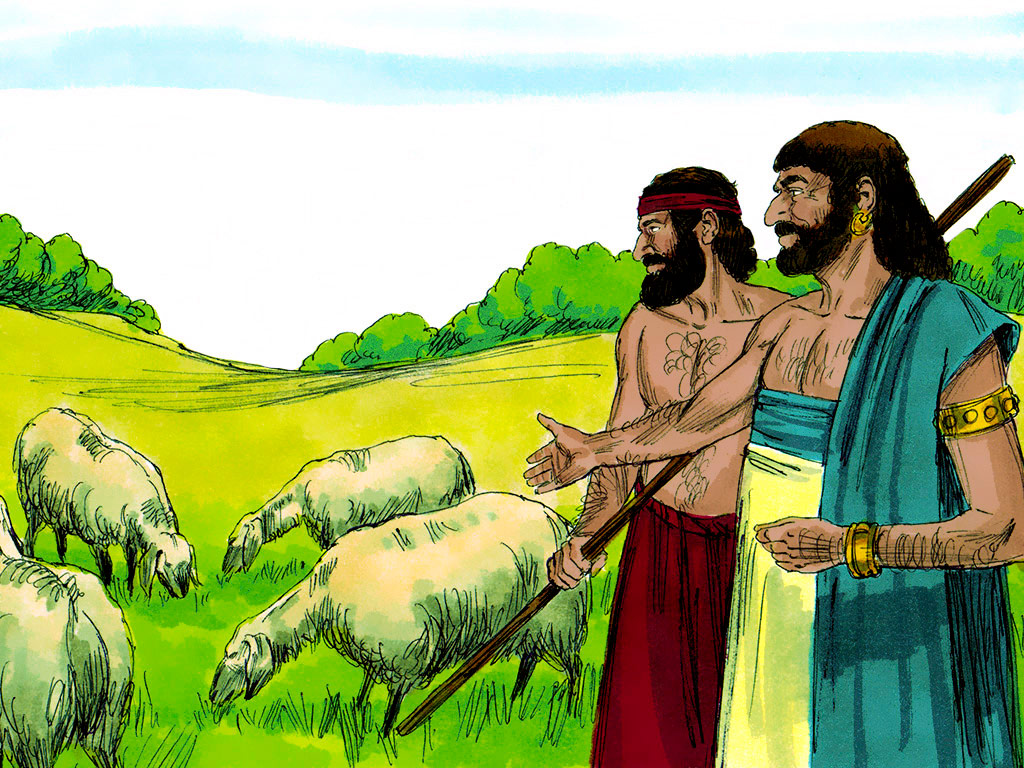 Chapter 1 describes Job as a righteous man and extremely blessed in having 10 children, a huge servant staff, and extreme wealth. I guess you could say the Bible describes him as a patriarchal type of Warren Buffet or Bill Gates, fabulously wealthy and famous throughout the region.
Chapter 1 describes Job as a righteous man and extremely blessed in having 10 children, a huge servant staff, and extreme wealth. I guess you could say the Bible describes him as a patriarchal type of Warren Buffet or Bill Gates, fabulously wealthy and famous throughout the region.
Satan’s First Attack
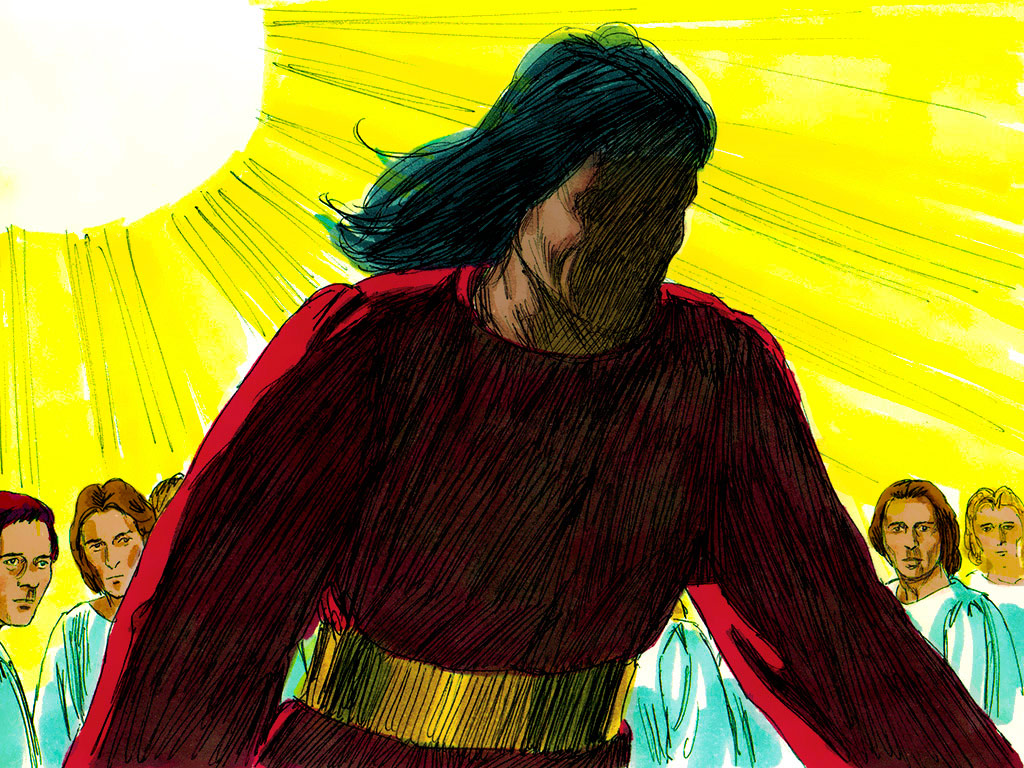 In verse 6, it describes Satan entering into God’s presence. It’s hard for us humans to get our minds wrapped around how our holy God would countenance the personification of evil in His presence, but that is precisely what this verse says, so it has to be the Truth.
In verse 6, it describes Satan entering into God’s presence. It’s hard for us humans to get our minds wrapped around how our holy God would countenance the personification of evil in His presence, but that is precisely what this verse says, so it has to be the Truth.
Here we have yet another major distinction between Job and any Christ-follower at any time throughout history. The Hebrew word for Satan here is not his name, but his title. Here is how the Hebrew lexicon defines it:
- satan
- adversary, one who withstands
The Book of Revelation calls him the “Accuser of the Brethren.”
Then I heard a loud voice saying in heaven, “Now salvation, and strength, and the kingdom of our God, and the power of His Christ have come, for the accuser of our brethren, who accused them before our God day and night, has been cast down .
Revelation 12:10
This verse also supports the differentiation I am trying to describe here. Back in Job’s day, Satan indeed had access to the presence of God to prosecute all of mankind before the throne. The basis of those accusations was sin. Because all have sinned (see Romans 3:23), there was no viable defense any human could present to counter his accusations.
The finished work of Jesus destroyed both Satan’s access to God as well as his power over us through sin, guilt, and shame. The New Testament epistles repeatedly reinforce this crucial concept by recounting Jesus’ surpassing victory over Satan through the Cross and His resurrection. Thus, our accuser was cast down (the same term used when Jesus cast out demons). Bottom line? Satan no longer has our sins as evidence to wield against us in the heavenly courtroom.
All Satan has left is a single tool: deception. Since Jesus Himself called him the Father of Lies (see John 8:44), we can safely assume he has an otherwise insurmountable mastery of them. That mastery can only be overcome by the power of God’s Word, the grace of God, and the revelation and power of the Holy Spirit Who indwells all Christ-followers.
Back to Job
God says something interesting to Satan about Job. He asks if Satan has “considered” Job. Most preachers interpret that as meaning God was bragging on Job to Satan. I’ve actually heard scripturally ignorant people say something along the lines of, “God made a bet with Satan and Job lost.”
However, when you look up “considered” in a Hebrew lexicon, you will find it’s the word siym. Interestingly enough, there are other definitions found there, ones like “to lay violent hands on” and so on. In context of subsequent events that transpired, it would be a bit more accurate to say that God was accusing Satan of hatching some sort of evil plan to destroy Job.
Then Satan appears to obtain permission from God to attack Job. Could there be an alternate interpretation? I believe there is. Take a quick glance at where Job says:
For the thing I greatly feared has come upon me, And what I dreaded has happened to me.
Job 3:25
The idea that Job was operating in fear rather than faith is bolstered by the description of his behaviors in verse 5. And God answers Satan in verse 12 in an unusual way. He doesn’t overtly give Satan permission, but says, “Behold, all that he has is in your power…” Is it possible God was saying words to the effect of, “You already have power over him” due to Job’s fear? But God did limit Satan to not touch Job’s physical body.
 And we see what happened. Job lost almost everything: his children and his wealth. Job’s response was to not blame God and get bitter, something those who quote this book so casually should take note of. Though he incorrectly attributed the catastrophes to God rather than Satan, God doesn’t hold his ignorance against him and again states Job was blameless and without sin.
And we see what happened. Job lost almost everything: his children and his wealth. Job’s response was to not blame God and get bitter, something those who quote this book so casually should take note of. Though he incorrectly attributed the catastrophes to God rather than Satan, God doesn’t hold his ignorance against him and again states Job was blameless and without sin.
Satan’s Second Attack
 Chapter 2 starts with the same scene portrayed in Chapter 1: God’s holding court and Satan shows up. God again asks the devil if he has “considered” Job.
Chapter 2 starts with the same scene portrayed in Chapter 1: God’s holding court and Satan shows up. God again asks the devil if he has “considered” Job.
This brings up a translational issue because the Hebrew word for “considered” here in Chapter 2 is different from the word used in Chapter 1. Instead of siym, the word used in verse 3 is leb, which — in addition to “considered” — also means “heart”, an “inclination”, a “determination of will”, among others. It would be safe to state, given the context, that God was asking Satan, “Have you truly set your heart on destroying Job?”
Again, God does not necessarily give Satan permission, but simply states, “he is in your hand.” So again I have to ask the question: Is God giving permission or did Job already give the devil an opening through his fear?”
 The end result was Job was in severe pain. His worthless wife chimes in and exhorts Job to “curse God and die,” probably blaming him in her grief for the demise of their children.
The end result was Job was in severe pain. His worthless wife chimes in and exhorts Job to “curse God and die,” probably blaming him in her grief for the demise of their children.
Again, Job incorrectly attributes the evil which came his way to God, though God again doesn’t hold Job accountable for his ignorance of the facts — He declares Job righteous yet again.
Then his “friends” show up. What a bunch of losers! But we’ll get to them in minute after we cover this first:
Job Has a Pity Party
 In Chapter 3, Job now commences to feel sorry for himself and whines to his friends. Frankly, if any of us was in the shape he was in and going through what he was going through, I don’t think many of us would do much better, even with our being able to appropriate the grace of God. Almost all of us would be whining, as well, and most of us would be blaming God and angry/bitter at Him for being “unfair” and a bunch of similar nonsense.
In Chapter 3, Job now commences to feel sorry for himself and whines to his friends. Frankly, if any of us was in the shape he was in and going through what he was going through, I don’t think many of us would do much better, even with our being able to appropriate the grace of God. Almost all of us would be whining, as well, and most of us would be blaming God and angry/bitter at Him for being “unfair” and a bunch of similar nonsense.
Job’s “Friends” Accuse Him & Job Defends Himself
 In Chapters 4-31 we have what feels like an interminable exchange of arguments back and forth between Job and his first three so-called “friends” in which they go back and forth with his friends accusing him of offending God somehow and telling how he needs to ‘fess up and repent to which Job responds by defending his own righteousness.
In Chapters 4-31 we have what feels like an interminable exchange of arguments back and forth between Job and his first three so-called “friends” in which they go back and forth with his friends accusing him of offending God somehow and telling how he needs to ‘fess up and repent to which Job responds by defending his own righteousness.
The friends’ comments are a veritable litany of what I have termed elsewhere as “man’s religion.” It is also a master class in what not to say to those who are suffering the vicissitudes of life.
Elihu Weighs In
The next section of Job’s saga begins with:
So these three men ceased answering Job, because he was righteous in his own eyes .
Job 32:1
Elihu, the youngest of Job’s friends present, then speaks up for the first time and spends the next 5 chapters taking the lot of them to task: Job for his self-righteousness, the other three for their own self-righteousness and judgmental attitudes.
God Shows Up & Sets the Record Straight
I love God’s opening remarks to all these folks in Chapter 38:
Who is this who darkens counsel by words without knowledge?
Job 38:2
 In other words, God is telling the whole lot of them they are all full of bovine scatology and goes on for a couple of chapters declaring exactly Who He is and who Job and his friends aren’t.
In other words, God is telling the whole lot of them they are all full of bovine scatology and goes on for a couple of chapters declaring exactly Who He is and who Job and his friends aren’t.
At the beginning of Chapter 40, He then addresses Job personally and starts taking him to task for his words.
An interest item shows up later during God’s questioning of Job:
Then I will also confess to you that your own right hand can save you.
Job 40:14
I’m frankly still at a loss of what exactly God is saying here. Could Job have prevented his catastrophes through refusing to indulge in fear? Could it be Job had revelation of some sort of spiritual authority unspecified in the text and unused by him to turn events around? I have to admit I don’t know and I truly wonder if there is anyone who does this side of heaven.
Job Repents, God Rebukes Job’s Friends, God Restores Job’s Family & Fortunes
Anyway, God finishes by the end of Chapter 41. In the opening verses of Chapter 42, Job repents and essentially says, “Wow, did I ever stick my foot in my mouth!”
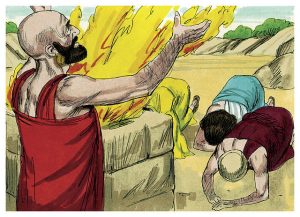 God goes on to rebuke Job’s friends and tells them to offer up a burnt offering of bulls and rams in the presence of Job. Then Job would then pray for them, and they would be forgiven.
God goes on to rebuke Job’s friends and tells them to offer up a burnt offering of bulls and rams in the presence of Job. Then Job would then pray for them, and they would be forgiven.
When Job prayed for his friends (please note the power of forgiveness at work here), it says Job was restored double what had been taken from him, he had ten more kids and his daughters were some of the hottest babes around.
Summary
James, the half-brother of Jesus, wrote in his epistle:
Indeed we count them blessed who endure. You have heard of the perseverance of Job and seen the end intended by the Lord — that the Lord is very compassionate and merciful.
James 5:11
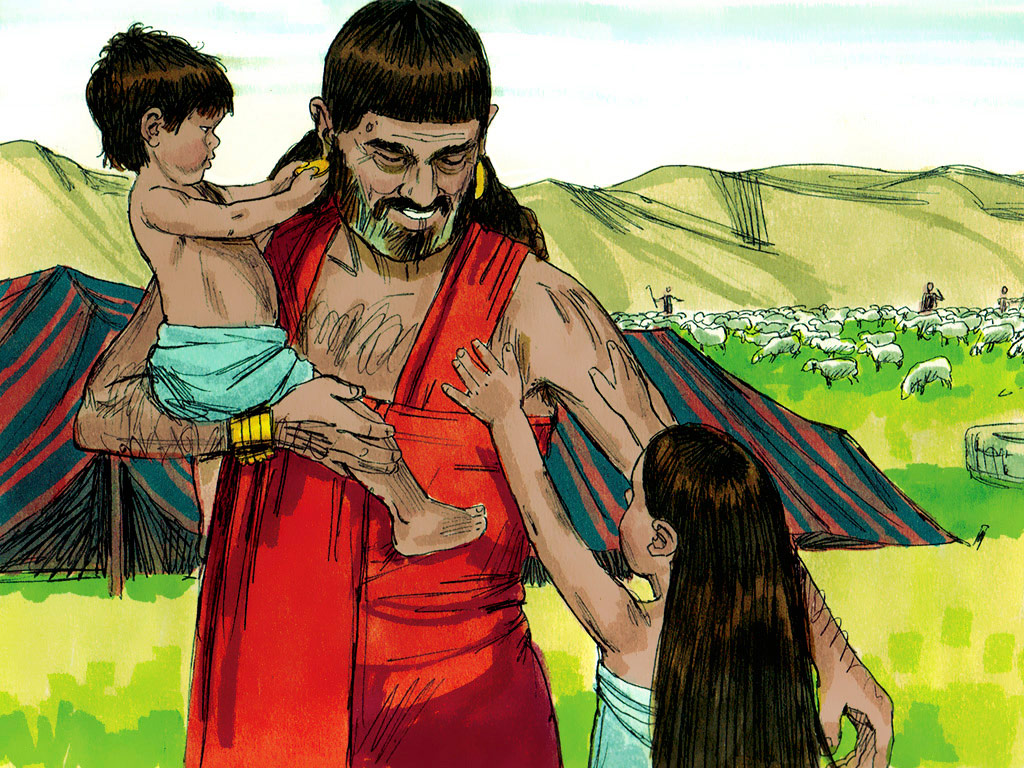 So this to me puts a final coup-de-grace to the notion God visited evil upon Job, even passively. It echos what generation after generation of God’s people in the Old Testament proclaimed when they worshipped God in the beauty of holiness:
So this to me puts a final coup-de-grace to the notion God visited evil upon Job, even passively. It echos what generation after generation of God’s people in the Old Testament proclaimed when they worshipped God in the beauty of holiness:
Oh, give thanks to the Lord, for He is good! For His mercy endures forever! 1 Chronicles 16:29
God is a good God! And the devil is a bad devil!
Thanks for reading!

